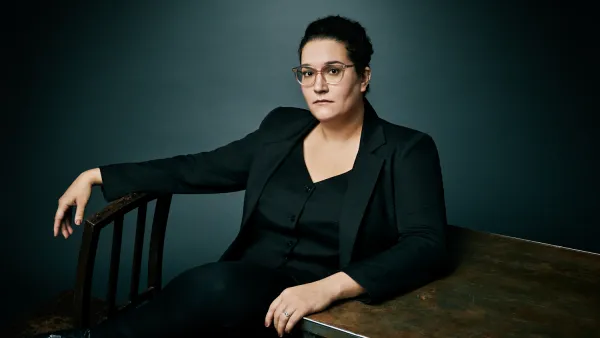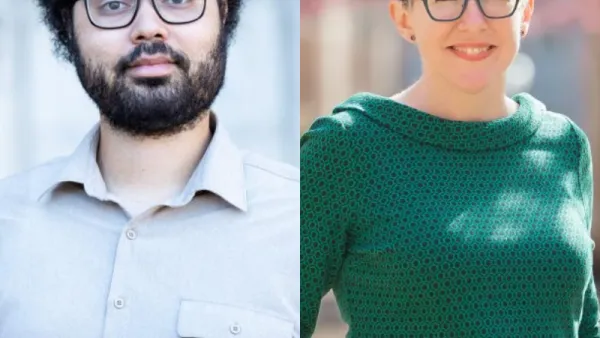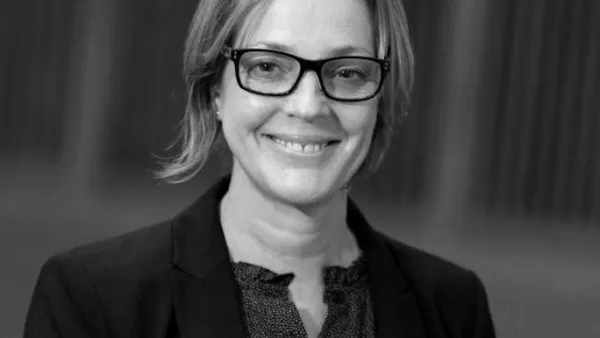Machado will read from her memoir and discuss the banning of her books on September 25 in Holmes Lounge as part of a Center for the Literary Arts-sponsored event.
Carmen Maria Machado, the multiple award-winning author behind the short story collection Her Body and Other Parties and the memoir In the Dream House, will visit WashU on September 25 for a reading and discussion at Holmes Lounge as a part of Banned Books Week.
Sponsored by the Center for the Literary Arts, the event will delve into Machado's experiences in having her books banned and feature Machado reading from In the Dream House.
The winner of numerous honors, including the Lambda Literary Award for Nonfiction, the Bisexual Book Award, and the Judy Grahn Award, In the Dream House details an abusive relationship that Machado endured while studying at the Iowa Writers' Workshop. Her retelling of that abuse is refracted through several unexpected genres, including fantasy, science fiction, spy thriller, and more, creating an inventive, shape-shifting blend of storytelling.
Ahead of her visit, we spoke with Machado over Zoom about her personal history with banned books, the staying power of In the Dream House, and how she advises young authors looking to write autobiographical nonfiction.
You're visiting WashU for Banned Books Week. All of us love the unintended backfire effect of banned books gaining new notoriety because they were banned in the first place. Was there a book, whether it was in your youth or when you were older, that you discovered because of its infamy or because it was banned?
When I was a kid, I was really active at my local public library. There was a lot of youth outreach programming, and I was super, super involved, from when I was in sixth grade all the way through high school, because I was cool. (laughs)
They had Banned Book Week every year, and I would literally run into the library. They had a display, and they would have all these books that had been banned for various reasons. At some point they were like, "Carmen, stop destroying our display. You can check out books, but don't check out all the books in the banned book display."
There were so many — Fahrenheit 451 and Ray Bradbury in general, the Scary Stories to Tell in the Dark books, The Chocolate War, I Know Why the Caged Bird Sings, Bridge to Terabithia — if they told me I wasn't allowed to read it, I was all over it. I used to have a Banned Book Week pin that was my prized possession.
Your talk at WashU will cover the banning of your own books. Which titles of yours have been banned and how did you react to those instances?
All of my books have been censored in various contexts.
The big thing that happened with my memoir was that during COVID, I received a message from a reader on Instagram, "There was a school board meeting at Leander Independent School District in Texas last night. And someone, like a parent, furiously read out loud from your book while waving a dildo around." I found the video of this school board meeting, and there was indeed this woman reading from my memoir (In the Dream House) — and of course, the book is about domestic violence. She was reading, of course, all the sexual parts, while literally gesticulating with a dildo. And at first, it was super funny. But after she's done reading, she starts talking about "grooming" and how this book is grooming students. That's when I stopped laughing.
We're coming up on five years since the publication of In the Dream House...
I hate that number, but yes, that's true. I just realized the other day that we were at about five years. That feels not possible.
And of course, this book predates its publication. You spent many years working on it and you've been living with this material for a very long time. Given that this book has been such a success, given that you have spent so much time reading from it and talking about it, does it change how you look back on that era of your life? Does it at all change your relationship with your trauma?
The thing about reading from a book like this — and this will be true when I read at WashU — I always read the same parts. Because for me, writing the book was so difficult, and the material is so difficult, and I continue to find it difficult.
I still get dozens of messages every month from readers about it, and whenever I do events, it's the book that people speak to the most. To be clear, I love hearing from people who tell me that the book meant something to them. That's very special to me, and honestly makes me feel like it was worth it. Because sometimes I would feel like it wasn't worth it, because I'd be in such pain.
Honestly, I don't know how people write more than one nonfiction book. Because I wrote one and it's enough for me. (laughs) I'm done. Back to fiction for me.
There are going to be several students in the audience when you visit WashU. Do you have any advice for writing autobiographical nonfiction? Obviously, you took a very unique approach to your memoir. But what would you say to students who are looking to explore their own lives in their writing?
The first thing I would say is the thing that I say whenever I teach a nonfiction class, which I do occasionally: you are not your trauma, and your currency is not your trauma. If you want to write 50 essays about cooking in the kitchen, and you don't want to write about your sexual assault, that's fine.
I remember noticing this in the early '00s when I was a grad student, and I was just coming into writing. Every other day, there would be some poorly edited essay that would come out online, revealing someone's most horrific secret. They'd probably been paid like $50 for it — if that — and they were often young women. Not always, but often. And I always found that so distasteful, and so ugly. That model has evolved, but I still think we do it.
I chose very intentionally to write what I wrote. And it was so hard to have that out in the world. I can't imagine how it would feel to have produced something that was anything less than the most intentional project I could have possibly done.
So if you do want to write about your trauma and things that have happened to you, you also have to ask yourself: am I in the right place mentally to talk about this? Am I at a sufficient distance? Because I remember early on, I tried to write about the material that's in the memoir when it was very fresh. Everything I wrote was terrible, because I was too sad, too raw to write anything interesting. I just had no perspective on what had happened to me. The minute I started thinking in this other way about genre and structure, it felt like it gave this effervescence and this energy that it hadn't had before, which made the project feel possible.
We're not often in the business of breaking news, but do you have any updates on your next project?
I'm working on it, literally, right now. I'm working on a new collection: A Brief and Fearful Star. I don't know when it will be out, but I'm hoping soon.




